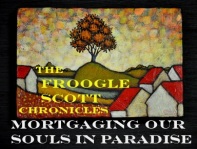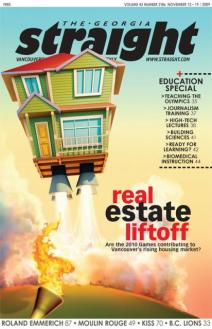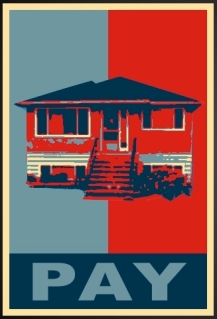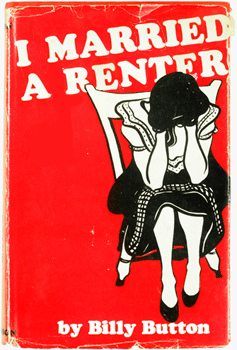“Well I guess the first question is, is there a real estate bubble at all? … We had a financial crisis, the largest we’ve seen since the Great Depression, we had an ensuing global recession, and if that isn’t a trigger or tipping point, for any kind of inflated market to see a major correction, I don’t know what is.”
– Cameron Muir, Economist, BC Real Estate Association
(from ‘Is Vancouver’s housing bubble about to burst?’, CTV 27 Sept 2011)
The argument is that the bubble hasn’t yet imploded so it doesn’t exist.
– vreaa


































Where exactly are all the future millionaires going to come from to continue to purchase these houses at grossly overinflated prices? We are on the verge of the second (larger) leg of the economic collapse. Canadian house prices can remain this high if a huge wave of millionaires magically appears out of thin air. If that happens then Canada truly is magically immune to the economic turmoil of the world. What a fairy tale!
I always wondered that question myself. Who exactly are all those boomers going to sell their millions of dollars of assets to? Well apparently the answer is the young people (if only they would you know, actually work hard like their boomer parents) and the growing wealthy people in developing countries like Asia, India, Brazil, etc whose aspirations and goal in life is to hand over their hard earned cash for boomers’ assets in another country on another continent!
“Who exactly are all those boomers going to sell their millions of dollars of assets to”?
immigrants.
We haven’t gone from 25M to 35M in the past two decades on natural birth rates. Please wake up
An immigrant to Canada earns 63 cents to the dollar that a native born does.
http://www.cbc.ca/news/business/story/2008/05/01/censusfeature.html
And that’s been shrinking, quite drastically.
As of 2005, median income for native born man with degrees: 62k
immigrant with degrees: 30k
But they are going to save the housing market. This should be interesting to watch.
“Canadian house prices can remain this high”
only 3 cities in Canada can be classified as having high prices. And these millionaires are coming from overseas? Wake up, you missed the last 25 years of Canadian migration and housing trends.
Two things: Firsty, I find the wording of CTV’s question highly intriguing. It *isn’t* “Does Vancouver have a housing bubble?” It’s “Is Vancouver’s housing bubble about to burst?” The question itself acknowledges that a bubble exists and merely asks if it will burst. That is a dose of reality we have not seen until recently.
Secondly, our pal Cam (Muir, not Good – let’s not get our slimy Cams mixed up here) has TWO monitors, people. With two monitors, he gets to see twice as much information! Just look at all that data! He clearly knows everything. I give up.
All these nicknames are getting confusing. Can “Cameron” also be abbreviated as “Chaz”?
This piece was such a shameless plug that even my wife, who would buy a house this moment if she could, was shocked.
She said to me, “but this is supposed to be a news story!” I welcomed her to the contemporary world of the payer (RE industry) picking the piper’s (media’s) tune.
Bubble hasn’t exploded because the Chinese can still borrow money at low rates in China. Wait till the immigration gauntlet in Canada coupled with Chinese lending control policies, and interest rates rise in Canada. You won’t have a bubble, you’ll have a tsunami of a correction, but then again the problems won’t be with BCREA it will be with the purchasers.
yah metro, just wait until immigration in Canada comes to a halt!
LMFAO
“Chinese can still borrow money at low rates in China.”
Chinese can still borrow money at low rates IN CANADA. Fixed. Chinese borrowing rates are high, the play many Chinese are making is rolling over their debts into new loans, often with suspect collateral. Spoiler alert: it doesn’t end well.
Others could, I suppose, carry interest off savings in China to pay off low interest loans on Canadian real estate. I think they have a name for that. Arbitrage or somethingorother.
I’m glad the Gods created archivists.
Too kind.
keep on renting like you’ve done for the last 10 years.
We note that almost the sole bullish argument now heard appears to be “immigration! immigration! immigration!” (with a soupçon of “low interest rates forever”).
This is “immigration (without supplanting jobs for locals)”. Warren Buffett suggested this as a way of curing the housing crisis in the US. Get it while the getting’s good.
yes, and most immigrants don’t come with piles of cash.
While I agree the bullish arguments are somewhat uncoordinated and some have border idiotic, I actually have a question for you guys. Because let’s put some tangible numbers to this thing. What do you predict Vancouver’s average housing price to be three years from today? And five years from today?
The reason why I ask this is because simply saying that the market will go down at some point in the future is useless to some people like myself who MUST buy a place in order to get married, so I had to bite the bullet thanks to a ton of family pressure. There might be a lot of other people who might be able to hold out for a short while but not much after that. When I talk about Asian culture, this is part of what I am talking about. Young people are forced into the market thanks to their parents or the parents of their significant others.
When housing prices crash, I’d bet that the ‘cultural’ attitude to buying that you describe changes.. no culture champions ‘losers’. (and, of course, at the very point that buying is most vilified, it’ll be the right time to buy).
Regarding your question about prices in 3 years or 5 years, who knows?
But, do you know that, after the last bust in Vancouver (1981), it took 25 years (yes, twenty five years) for real prices to return to the 80-81 peak?
I bought a place after I got married, but it was in Taiwan. We vacation there every year.
As for prices 3 to 5 years from now, who knows, But is it really wise to buy now if you did not “have to”? Apparently 3 of my close friends thought so.within the last 4 months.
Julian, yours is a tale of woe. From my experience there are few if any arguments that can be used to convince someone otherwise, whose intuition tells them to buy.
Here’s the thing though, it’s not like all parents of Asian origin impose such onerous and risky investments on their children. Sometimes you have to take a step back and ask if it’s cultural or if it’s really something else.
Agreed Jesse, it is a lost cause for me unfortunately. I was pretty lucky though as I found a SFH who only went up about 5% from 06 prices in a desirable neighbourhood in coquitlam. But I had to search really hard for this deal and since then the house has gone up about 10 to 15 percent (went up by 10% immediately in assessment about 1 month after I bought) but I doubt that the premium that I have gained will last.
I am comfortable holding it for the long term as I am confident that it will be able to weather a price correction nicely with a price to rent ratio of about 240 which is hard to find these days. My parents’ argument is that if you are going to live there for 30 years, who cares what happens to the price of it as long as you can find a good deal. Hard to argue with them as if I mention the word rent it seems like I am committing blasphemy.
“What do you predict Vancouver’s average housing price to be three years from today? And five years from today?”
I’m no expert, but I think short term timing depends on the Eurozone. It’s wobbly, and it’s been wobbly ever since the US housing shock drop. I have my doubts about the Germans saving the day, but I’ve been wrong before. I
Long term I think Vancouver is overleveraged and salaries are stagnating. However, there are more salary stabilizers in Canada then the US.
In terms of your own situation I guess I’d weigh the financial risks. It’s not wrong to spend money if you’re getting some sort of emotional value/stability in return from the trade.
The real danger of a drop comes if you need to move. I’ve got friends who are hundreds and thousands of $$$s underwater in the US, but as long as they don’t need to move (and keep their jobs) they are doing fine and are happy. I’d also make sure I could handle future interest rate hikes.
“MUST buy a place in order to get married”…
A serious contender for best laugh ‘o the week (notwithstanding the ‘existential crisis’ it hallmarks for most young men – regardless of ethnic/cultural origins). Which reminds me, I wonder if Derp has scraped together enough goats/cows to make ‘BridePrice’ in Coquitlam yet? – If not, rumour has it that in exchange for tolerating an evening of bad Karaoke a very generous ChinesePhilanthropist (Chen Guangbiao) is doing what he can to mitigate the pre-marital woes of bachelors in Bijie, Southwest China’s Guizhou province…
[ChinaDaily] – Chinese billionaire’s song for the poor
“Chen, from East China’s Jiangsu province, announced during the concert that he was giving away 1,000 goats, 2,000 pigs and 113 farming machines…”…
http://tinyurl.com/64oedbv
PS – In my experience, Mr. Lee – the in-laws were the most coercive (or was that corrosive?) factor. Confucious says: “Wise men know, It is far easier to sell UglyHouse than liquidate wife with bad FengShui.”
This article(?) sort of complements Julian Lee’s (and a few of the vreaa bloggers) view of why Chinese people flock here: http://www.househunting.ca/vancouversun/real+estate+richmond/5471831/story.html
Regarding SR’s link:
“Leading the way in Canadian real estate is Richmond, where median home prices are rising fast.” (Vanc Sun, 28 Sep 2011)
Is that indeed the case?
Hasn’t Richmond softened through the summer?
I was told by a visiting couple that Vancouver is a desirable destination to emigrate to because its really the only place in the English speaking world where they wouldn’t have to speak English. High home prices are simply not a factor for them as they are able to leverage their life savings to buy some form of property and then simply survive while their kids get a free education and their parents get free medical care. This has pretty much been the story for Vancouver over the last 30 years but things are starting to change as more and more of these immigrant’s kids are leaving/returning because they can’t survive as middle-class in Vancouver. This hollowing out of Vancouver’s middle class has gotten to the point where the city is becoming extremely unattractive as a destination for most Westerners.
Vreaa: Yes, Richmond has softened, but I could have told you that 5 months ago. If you look at the charts, Richmond’s steep price climb came a screeching halt once the Japanese earthquake hit and all these people realized that they were living in a tsunami zone. Now you can’t go to a Richmond open house to find a Chinese immigrant for a buyer, I went to a few already checking out renovation ideas, they are demanding higher ground (god knows why it took a major tsunami for them to clue in). So the march earthquake is right about the same time when Burnaby’s prices have gone up significantly because a ton of money from Richmond is starting to pour out into other places in Vancouver.
Nemsis: Yes, that’s very true, however, it is a bit of a Chinese tradition and usually the bride’s family expects that the groom has a house or apartment ready. Can’t fight that, but at least parents back up their demands with money. Hence my mortgage is more of an entire family matter rather than my own. So luckily if something does happen, then we can pool together our income to service the house which puts my debt to income ratio in a much better position.
Question for Chaz and Presto ->
1. What percentage of your net-worth is in Vancouver/BC RE?:
(a) 80%
(b) 100%
(c) 400%
(d) 500%
(e) >1000%
This reminds of the guy that jumps off the 30th floor of a building and when he goes by the 4th floor he says, “Well, everything’s fine so far”.
Examples of folks in some of the above situations:
(a) 80%: Boomer couple own west-side home with current market value $2M, only other assets $500K in RRSPs
(b) 100%: Single guy owns $500K Yaletown condo, has $100K mortgage but also $100K in non-RRSP investment account.
(c) 400%: Local realtor owns primary residence SFH with current market value of $1.3M, and four rental condos with total current market value of $1.5M. Total property value $2.8M; outstanding mortgage/HELOC $2.1M; equity in properties $700K; no other savings or investments (stock market is for lunatics).
(d) 500%: Couple purchases $1M lower mainland SFH with sum total of everything they have going into $200K downpayment.
(e) >1000%: Single thirty-something buys $300K condo with entire life-savings, $25K, as down payment.
[(f) Infinite: Couple buys $350K condo with 5% downpayment borrowed from parents and various closing costs going onto CCs and LOC; no savings/investments. Net-worth is negative; RE holdings $350K.]
This guy seems to think the bubble (and everything else in the world) has burst…and is happy about it.
http://business.financialpost.com/2011/09/27/anyone-can-make-money-in-a-market-crash/
The ruthless truth about traders.
BBC just can’t get their heads around it; at first they thought it was a hoax.
Related story: ‘Share Traders More Reckless Than Psychopaths’.
They thought this guy was a hoax also.
‘BETWEEN the remarkable take on the global economy in this video and the interviewee’s traderly insouciance, I’m not sure whether to laugh or cry. Or grab a pitchfork. Or call him for investment advice. You be the judge.’
http://www.economisCt.com/blogs/freeexchange/2011/09/apocalypse
http://www.globaltvbc.com/a+leaky+situation+for+bc+place/6442489912/story.html
Has this been posted somewhere?
Not sure which is more infuriating, the fact its leaking or that the people being interviewed on the street being interviewed think this is ok and don’t seem to give a shit.
Pass ye not judgment ere the insects are flattened under high heat.
Good news: BC Place roof has been fixed.
http://tinypic.com/r/b7l9bl/7
hahahaha
thanks
I thought East Van had exclusive IP rights on tarpaulin technology.
Mr. Muir works for the BC Real Estate Association… his comments are to be expected and totally predictable. Here in the US, we heard the same sort of denial by the NAR (National Assn. of Realtors) right up to the property crash which as we all know spread quickly throughout America. Even here in San Francisco with its supposedly bulletproof property market, the market has fallen 30-40% from its peak in 2006, all while the local SF Assn. of Realtors was in deep denial and spouting off the same BS as Mr. Muir is doing now. Property bubbles burst and Vancouver… a city I’m fond of very much… is no exception.
Follow-up on my comment just posted. For those who think property prices will never go down in Vancouver, remember that Van shares many similar physical and demographic characteristics with San Francisco, e.g. densely populated city, mostly surrounded by water, with no room to grow but up… “everybody” wants to live in SF… large Chinese population (30% of total SF city population); lots of Chinese investors… need I go on…?
SF in late 2006, just before the bubble burst, looked a lot like Van now.
Thanks, Christopher.
but did you have the Best Banks on Earth?
laughed out loud after I read this one. 🙂
except people in San Francisco actually have viable careers
Cash crunch in China causing capital repatriation?
They wife and I frequent the buy and sell section of Vansky, a mainland Chinese forum site. Its kinda of like their Craigslist.
Every single transaction we have made have been at rentals, always condos, sometimes really crappy ones.
We are not buying cheap stuff either, usually very nice home appliances, electronics etc
We see a lot of designer bags etc on sale, and also a lot of luxury cars lease takeovers.
After some small chat we have usually discovered most are selling off their stuff and moving back to China. I assume some with citizenship but we spoke to a couple that even with their maple cards they are tired of waiting for their citizenship and moving back to China for good.
This is a fascinating twist on past busts, such as HK in the 90s. Repatriation instead of mass exodus. The natives returning are undoubtedly outnumbered by foreign investors in China, so it won’t be any kind of new case study.
I believe the recent spike in capital inflows into China has been to pay down debt – ie. margin calls. China basically has a credit crisis and a faltering property bubble coincident with declining global demand for their exports. Many analysts expect China Tier 1 city property will drop 10% within a year, 30% within 3 years and at least 50% in 5 years. I would imagine a similar course for Vancouver?